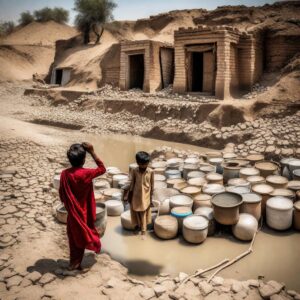Groundwater Recharging A Lifeline for Pakistan's Borewells And Communities

I emphasize the critical importance of borewell recharging through rainwater in Pakistan. In many areas, Pakistan faces significant challenges related to water scarcity, high groundwater extraction, declining water levels, and saline borewell water. Implementing rainwater harvesting techniques to recharge borewells can offer a range of benefits for the environment and the community.
Addressing Water Scarcity and Groundwater Depletion:
Pakistan heavily relies on groundwater for its water supply, often leading to over-extraction and depletion of this vital resource. Borewells are commonly used to tap into underground water sources. However, this unsustainable practice has led to declining water tables and, in some cases, even land subsidence.
By recharging borewells with rainwater, we can replenish the groundwater levels and restore the balance in the aquifer systems. This approach helps mitigate the adverse effects of over-pumping and contributes to long-term water availability.
Improving Water Quality and Reducing Salinity: Rainwater Harvesting
Saline groundwater is a significant issue in many parts of Pakistan. High salinity levels make the groundwater unusable for drinking, irrigation, and other purposes. Rainwater, on the other hand, is naturally pure and low in salts.
By diverting and collecting rainwater into borewells, we can dilute the saline groundwater, thus improving its quality over time. This method can also help flush out accumulated salts from the aquifers, gradually making the borewell water more suitable for various applications.
Promoting Sustainable Water Management:
Borewell recharging through rainwater aligns with the principles of sustainable water management. It reduces the dependency on non-renewable groundwater sources and encourages utilizing a local and abundant resource – rainwater. By capturing rainwater and allowing it to percolate into the ground, we recharge the aquifers in a controlled manner, preventing sudden fluctuations in water levels and safeguarding against environmental degradation.
Enhancing Community Resilience:
Rainwater harvesting and borewell recharging empower communities to actively participate in water resource management. This approach decentralizes the water supply system, reducing stress on centralized water distribution networks. Communities can become more resilient to water scarcity, especially during dry periods or droughts, as a supplementary water source is available.
Steps towards Implementation:
- Infrastructure Development: It is essential to construct suitable structures, such as rooftops, gutters, and channels, for rainwater collection and diversion.
- Filtration and Treatment: Rainwater should be properly filtered and treated before recharging to prevent contamination of the aquifers.
- Educational Campaigns: Educational campaigns can raise community awareness about the benefits of proper rainwater harvesting techniques and encourage widespread adoption.
- Policy Support: Government policies that promote rainwater harvesting and borewell recharging can accelerate its implementation and ensure its long-term success.
Benefits of Rainwater Borewell Recharging in Pakistan
Rainwater borewell recharging holds significant importance and offers many benefits for Pakistan, where water scarcity, groundwater depletion, and poor water quality are pressing concerns. Here are the key importance and benefits of implementing rainwater borewell recharging in the country:
Sustainable Groundwater Management
Rainwater borewell recharging plays a pivotal role in managing groundwater sustainably. Pakistan heavily relies on groundwater for various purposes, including agriculture and domestic use. By replenishing aquifers through rainwater recharging, we can balance the extraction rates, ensuring a continuous and reliable water source for present and future generations.
Mitigating Groundwater Depletion
The over-extraction of groundwater has led to a decline in water tables, which poses a serious threat to water security. Rainwater borewell recharging helps counteract this depletion by introducing additional water into the underground reservoirs. This gradual replenishment supports ecosystem health, reduces land subsidence, and prevents long-term water scarcity.
Improving Water Quality
In many regions of Pakistan, groundwater quality is compromised due to high salinity and contamination. Rainwater, being relatively pure, can dilute the existing saline groundwater and improve its quality. By directing rainwater into borewells, we can dilute pollutants and gradually enhance the overall water quality in the aquifers.
Drought Resilience
Pakistan often faces drought conditions, which strain water resources and lead to agricultural and societal challenges. Rainwater borewell recharging creates a buffer against droughts by storing excess rainwater underground during wet periods. This stored water can then be tapped into during dry spells, reducing the impact of water shortages.
Cost-Effectiveness
Implementing large-scale infrastructure projects for water supply can be financially burdensome. Rainwater borewell recharging offers a cost-effective alternative. It utilizes existing borewells and rainwater collection systems, reducing the need for extensive construction and maintenance of new water storage facilities.
Localized Water Management:
Rainwater Harvesting borewell recharging encourages localized water management, empowering communities to take charge of their water resources. This decentralized approach reduces the strain on centralized water supply systems and promotes community involvement in sustainable water use practices.
Environmental Conservation
Rainwater Harvesing borewell recharging aligns with environmental conservation efforts. By relying more on rainwater, we reduce the stress on rivers, lakes, and other natural water bodies, preserving these ecosystems and their biodiversity.
Long-Term Water Security
Implementing rainwater borewell recharging strategies contributes to long-term water security by ensuring a steady and dependable water source. This security is vital for agriculture, industries, and households, reducing vulnerabilities to water scarcity-related disruptions.
Improved Agricultural Productivity
A significant portion of Pakistan’s economy depends on agriculture. Rainwater borewell recharging can benefit agriculture by maintaining adequate soil moisture levels and reducing irrigation demands, ultimately enhancing crop yields and farm productivity.
Adaptation to Climate Change
As climate change leads to uncertain precipitation patterns, it becomes crucial to adapt water management strategies. Rainwater borewell recharging provides a flexible solution that can adjust to changing rainfall regimes and help mitigate the impacts of climate variability.




